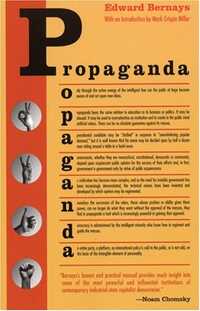
Propaganda
Chapter 1
Organizing Chaos
- Author :: Edward Bernays
- Publication Year :: 1928
- Posted: June 24, 2024
Important
Very important
Chapter 1 - Organizing Chaos
page 9:
-
The conscious and intelligent manipulation of the organized habits and opinions of the masses is an important element in democratic society. Those who manipulate this unseen mechanism of society constitute an invisible government which is the true ruling power of our country.
-
We are governed, our minds are molded, our tastes formed, our ideas suggested, largely by men we have never heard of.
-
This is a logical result of the way in which our democratic society is organized. Vast numbers of human beings must cooperate in this manner if they are to live together as a smoothly functioning society.
-
Our invisible governors are, in many cases, unaware of the identity of their fellow members in the inner cabinet.
-
I don’t think this is at all true anymore, and maybe never was.
page 10:
-
Whatever attitude one chooses to take toward this condition, it remains a fact that in almost every act of our daily lives, whether in the sphere of politics or business, in our social conduct or our ethical thinking, we are dominated by the relatively small number of persons a trifling fraction of our hundred and twenty million—who understand the mental processes and social patterns of the masses. It is they who pull the wires which control the public mind, who harness old social forces and contrive new ways to bind and guide the world.
-
It is not usually realized how necessary these invisible governors are to the orderly functioning of our group life. In theory, every citizen may vote for whom he pleases. Our Constitution does not envisage political parties as part of the mechanism of government, and its framers seem not to have pictured to themselves the existence in our national politics of anything like the modern political machine. But the American voters soon found that without organization and direction their individual votes, cast, perhaps, for dozens or hundreds of candidates, would produce nothing but confusion.
-
party machines should narrow down the field of choice to two candidates or at most three or four.
-
In theory, every citizen makes up his mind on public questions and matters of private conduct. In practice if all men had to study for themselves the abstruse economic, political, and ethical data involved in every question, they would find it impossible to come to a conclusion about anything.
page 11:
-
From our leaders and the media they use to reach the public we accept the evidence and the demarcation of issues bearing upon public questions; from some ethical teacher, be it a minister, a favorite essayist, or merely prevailing opinion, we accept a standardized code of social conduct to which we conform most of the time.
-
The original influencers.
-
In theory, everybody buys the best and cheapest commodities offered him on the market. In practice, if every one went around pricing, and chemically testing before purchasing, the dozens of soaps or fabrics or brands of bread which are for sale, economic life would become hopelessly jammed. To avoid such confusion, society consents to have its choice narrowed to ideas and objects brought to its attention through propaganda of all kinds.
-
There is consequently a vast and continuous effort going on to capture our minds in the interest of some policy or commodity or idea.
-
It might be better to have, instead of propaganda and special pleading, committees of wise men who would choose our rulers, dictate our conduct, private and public, and decide upon the best types of clothes for us to wear and the best kinds of food for us to eat. But we have chosen the opposite method, that of open competition.
page 12:
-
We must find a way to make free competition function with reasonable smoothness. To achieve this society has consented to permit free competition to be organized by leadership and propaganda.
-
Some of the phenomena of this process are criticized—the manipulation of news, the inflation of personality, and the general ballyhoo by which politicians and commercial products and social ideas are brought to the consciousness of the masses. The instruments by which public opinion is organized and focused may be misused. But such organization and focusing are necessary to orderly life.
-
He keeps saying it is necessary without backing that up.
-
the technical means have been invented and developed by which opinion may be regimented.
-
With the printing press and the newspaper, the railroad, the telephone, telegraph, radio and airplanes, ideas can be spread rapidly and even instantaneously over the whole of America.
-
If he was talking about instantaneous spreading of messages in 1928, imagine how much fast it has gotten with the internet.
-
H. G. Wells senses the vast potentialities of these inventions when he writes in the New York Times
-
“Modern means of communication—the power afforded by print, telephone, wireless and so forth, of rapidly putting through directive strategic or technical conceptions to a great number of cooperating centers, of getting quick replies and effective discussion—have opened up a new world of political processes. Ideas and phrases can now be given an effectiveness greater than the effectiveness of any personality and stronger than any sectional interest The common design can be documented and sustained against perversion and betrayal. It can be elaborated and developed steadily and widely without personal, local and sectional misunderstanding."
-
Brainwash people with catchphrases and maintain the purity of the message with total top-down control without having and “misunderstandings”.
page 13:
-
What Mr. Wells says of political processes is equally true of commercial and social processes
-
The groupings and affiliations of society to-day are no longer subject to “local and sectional” limitations. When the Constitution was adopted, the unit of organization was the village community, which produced the greater part of its own necessary commodities and generated its group ideas and opinions by personal contact and discussion directly among its citizens.
-
But today, because ideas can be instantaneously transmitted to any distance and to any number of people, this geographical integration has been supplemented by many other kinds of grouping, so that persons having the same ideas and interests may be associated and regimented for common action even though they live thousands of miles apart.
page 14:
-
In the World Almanac, for example, the following groups are listed under the A’s:
- The League to Abolish Capital Punishment
- Association to Abolish War
- American Institute of Accountants
- Actors’ Equity Association
- Actuarial Association of America
- International Advertising Association
- National Aeronautic Association
- Albany Institute of History and Art
- Amen Corner
- American Academy in Rome
- American Antiquarian Society
- League for American Citizenship
- American Federation of Labor
- Amorc (Rosicrucian Order)
- Andiron Club
- American-Irish Historical Association
- Anti-Cigarette League
- Anti-Profanity League
- Archeological Association of America
- National Archery Association
- Arion Singing Society
- American Astronomical Association
- Ayrshire Breeders’ Association
- Aztec Club of 1847
-
There are many more under the “A” section of this very limited list.
-
Even then we had people trying to go easy on criminals and censor our language.
-
The American Newspaper Annual and Directory for 1928 lists 22,128 periodical publications in America.
-
With the internet, there are now likely millions around and accessible to the whole world.
page 15:
-
The circulation of some of these publications is astonishing. The National Live Stock Producer has a sworn circulation of 155,978; The National Engineer, of 20,328; The New World, an estimated circulation of 67,000. The greater number of the periodicals listed—chosen at random from among 22,128—have a circulation in excess of 10,000.
-
Again, the internet gives this kind of reach to individuals.
-
This modern proliferation can cut both ways. We now have access to a broader range of “publications”, but the largest (often corporate sponsored) sites end up leveraging the network effect to attract more eyeballs. While there might be hundreds of sites/podcasts/newsletters focusing on a particular niche, there are far more people looking at those corporate curated sites like Facebook and Reddit. If one goes against the narratives on sites like these, they will often find themselves shunned or banned.
-
The smaller sites can also fall victim to anonymous donations. If you have a small podcast that regularly gets $200 in donations per month, but one week you post a pro-narrative story and end up with $1,000 in donations, you maybe be more likely to produce similar content. From the content creator’s perspective they are giving the audience what they want - as supported by the increased donations. A single actor with deep pockets that wants to promote whatever narrative was covered in the podcast could easily be manipulating the content creator.
-
The diversity of these publications is evident at a glance. Yet they can only faintly suggest the multitude of cleavages which exist in our society, and along which flow information and opinion carrying authority to the individual groups.
page 17:
-
still represent but a part of those existing less formally but leading vigorous lives.
-
Ideas are sifted and opinions stereotyped in the neighborhood bridge club. Leaders assert their authority through community drives and amateur theatricals. Thousands of women may unconsciously belong to a sorority which follows the fashions set by a single society leader.
-
“Life” (magazine) satirically expresses this idea in the reply which it represents an American as giving to the Britisher who praises this country for having no upper and lower classes or castes:
-
“Yeah, all we have is the Four Hundred the White-Collar Men, Bootleggers, Wall Street Barons, Criminals, the D.A.R., the K.K.K., the Colonial Dames, the Masons, Kiwanis and Rotarians, the K. of C, the Elks, the Censors, the Cognoscenti, the Morons, Heroes like Lindy, the W.C.T.U., Politicians, Menckenites, the Booboisie, Immigrants, Broadcasters, and—the Rich and Poor.”
-
The Four Hundred, from Wiki:
-
The Four Hundred was a list of New York society during the Gilded Age, a group that was led by Caroline Schermerhorn Astor, the “Mrs. Astor”, for many years. After her death, her role in society was filled by three women: Mamie Fish, Theresa Fair Oelrichs, and Alva Belmont,[[2]] known as the “triumvirate” of American society.[[3]]
-
On February 16, 1892, The New York Times published the “official” list of those included in the Four Hundred as dictated by social arbiter Ward McAllister, Astor’s friend and confidant, in response to lists proffered by others, and after years of clamoring by the press to know who was on it.[[4]][[5]]
-
-
They say ‘The Four Hundred’, I say the oligarchy.
-
Yet it must be remembered that these thousands of groups interlace. John Jones, besides being a Rotarian, is member of a church, of a fraternal order, of a political party, of a charitable organization, of a professional association, of a local chamber of commerce, of a league for or against prohibition or of a society for or against lowering the tariff, and of a golf club.
page 18:
-
The opinions which he receives as a Rotarian, he will tend to disseminate in the other groups in which he may have influence.
-
Influencers, nothing new.
-
This invisible, intertwining structure of groupings and associations is the mechanism by which democracy has organized its group mind and simplified its mass thinking.
-
Emil Ludwig represents Napoleon as “ever on the watch for indications of public opinion; always listening to the voice of the people, a voice which defies calculation. ‘Do you know,’ he said in those days, what amazes me more than all else? The impotence of force to organize anything.’"
-
It has been recognized for a long time that manipulation is superior to force to control a population. Every tyranny that has ever risen has eventually fallen, but the modern Huxlean strategy of control via amusement has managed to entangle almost the whole world while very few even see it for what it is, let alone fight back against it.
-
It is the purpose of this book to explain the structure of the mechanism which controls the public mind, and to tell how it is manipulated by the special pleader who seeks to create public acceptance for a particular idea or commodity.
-
Again, he does not mince his words one bit.




